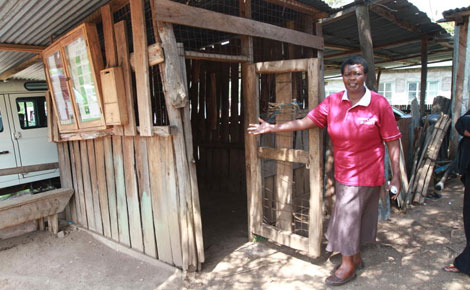 |
|
Bomet law courts Executive officer Miriam Sitienei shows the cell for suspects. |
They are supposed to be Kenya’s symbols of justice and equality but most courts across the country are in shambles. Some magistrates have no courtrooms, while some courtrooms also serve as holding cells for suspects.
In a number of law courts, magistrates share pit latrines with the public. Some confess they live under the shadow of uncertainty as they mingle with potentially dangerous suspects, while others sit in courtrooms that could collapse any time.
An investigation by The Standard on Saturday has exposed a deplorable state of facilities in the Judiciary.
Our inquiries in seven law courts spread in Central, Eastern and the Rift Valley exposed the distressing woes magistrates have to go through as they dispense justice.
Amid the pathetic conditions, claims of corruption and shortage of staff, there are over 177,000 pending cases, according to Judiciary figures. The rehabilitation of courthouses was part of the larger Judiciary Transformation Framework launched by Chief Justice Willy Mutunga in 2012, which aimed at enhancing the image of the institution.
In places like Marimanti in Tharaka Nithi County, the court registry also acts as a kitchen where tea is made for staff.
This exposes crucial files to a fire hazard and damage. At least two magistrates spoke of fear for their lives because they operate in condemned buildings that could tumble any time. Some courts lack holding cells for suspects, who have to stay locked up in police vehicles outside the courtroom as other cases are heard.
“We are still using shared pit latrines as you can see, members of the public included. The conditions are pathetic,” says Willy Cheruiyot, acting Senior Resident Magistrate (SRM) Tawa law courts.
Work in shifts
The courts lack clerks and prosecutors, which has led to delay in conclusion of cases. In some stations like Othaya, magistrates have been forced to work in shifts because only one court clerk is available.
The justice system badly needs reforms, even as it was revealed that a project to spruce up 11 stations and build new structures has collapsed.
Worth more than Sh600 million, the project was to set up prefabricated buildings. Contractors were to build backup offices and separate cell blocks for women, children and men. They were to construct chambers for magistrates, toilets and bathrooms and provide backup generators.
Launched last year, construction in the affected stations stalled in varied phases after the Judiciary allegedly stopped paying contractors. The judiciary had in 2012 identified Bomet, Othaya, Marimanti, Tawa and Wang’uru stations as priority areas where the prefabs were to be built. Other stations where construction commenced are Makueni and Runyenjes.
Limited space
However, due to lack of cash, tenders were not awarded for Garsen, Iten, Tamu and Eldama Ravine. The plan was to have 30 more constructed by 2017. With the date of the project’s revival unestablished, judiciary staff must contend with appalling working conditions.
Due to limited space, magistrates are forced to use their offices as open court rooms. All affected magistrates spoke freely about their concerns adding that other judicial staff as well as citizens still use pit latrines in a Government institution that is also the third Arm of Government.
Stay informed. Subscribe to our newsletter
In every station we visited, magistrates complained of shortage of staff. This most of the times leave registries and other crucial departments unmanned. Security officers in some stations serve as customer care assistants attending to the public. Lack of holding cells is still a challenge with suspects being held in open court rooms, something that magistrates say is a security risk.
Acting SRM Runyenjes court Paul Nandi, says his chambers serve as an alternative court room even though it cannot accommodate more than six people.
“It is very small. We always fear that criminals might attack especially when you are giving a judgment given the distance from where I am sitting,” he says.
So small is the court that people hearing cases have to do it outside. “One side of the court serves as a cell while the other one is used by the public and witnesses. We have nine officers who do not have working stations. In fact, we have leased space at the former District Commissioner’s offices,” Henry Nyakweba, Principal Magistrate Othaya says.
Heavy load
The Chief Registrar of the Judiciary Anne Amadi says contractors were unable to complete construction works even after payments had been made.
“Contractors haven’t told us why they were unable to complete the prefabs though payments have been made. We are engaging in this discussion with them to ensure the prefabs which have stalled are completed,” she says adding “they have to be completed, we cannot have them go to waste.”
But she gives an assurance that the Judiciary is determined to complete construction of all prefabricated courts across the country. However, the contractors have denied these claims. They say the Judiciary was responsible for the mess. (See separate story) On lack of staff, Amadi says a shortage was exerting a heavy load on those available.
“In fact in some stations we have had to use support staff to do responsibilities that shouldn’t be theirs. Each time we get a new judge we need staff but this hasn’t been commensurate,”Amadi says.
To cushion shortage, Amadi reveals that the Judiciary was undertaking a staff rationalisation programme before recruiting. The process that began in May, she says, will guide the Judiciary in determining a favourable recruitment procedure.
“I expect a staff rationalisation interim report next week that will guide us on what we need to do in terms of recruitment because we don’t want to carry out a recruitment process that is not informed by data. We need to know who is doing what and where,” Amadi says.
She agrees the Judiciary was alive to concerns over the rising wage bill but maintained they must strike a balance to ensure optimum service delivery. She says the Judiciary was similarly aware of lack of buildings for staff to work in.
“I agree the situation is pathetic. We have bill of quantities from affected stations and we have a priority list which was approved by Parliament. We also identified stations that will come up as new constructions and those that will be refurbished,” she adds.
 The Standard Group Plc is a
multi-media organization with investments in media platforms spanning newspaper
print operations, television, radio broadcasting, digital and online services. The
Standard Group is recognized as a leading multi-media house in Kenya with a key
influence in matters of national and international interest.
The Standard Group Plc is a
multi-media organization with investments in media platforms spanning newspaper
print operations, television, radio broadcasting, digital and online services. The
Standard Group is recognized as a leading multi-media house in Kenya with a key
influence in matters of national and international interest.
 The Standard Group Plc is a
multi-media organization with investments in media platforms spanning newspaper
print operations, television, radio broadcasting, digital and online services. The
Standard Group is recognized as a leading multi-media house in Kenya with a key
influence in matters of national and international interest.
The Standard Group Plc is a
multi-media organization with investments in media platforms spanning newspaper
print operations, television, radio broadcasting, digital and online services. The
Standard Group is recognized as a leading multi-media house in Kenya with a key
influence in matters of national and international interest.










